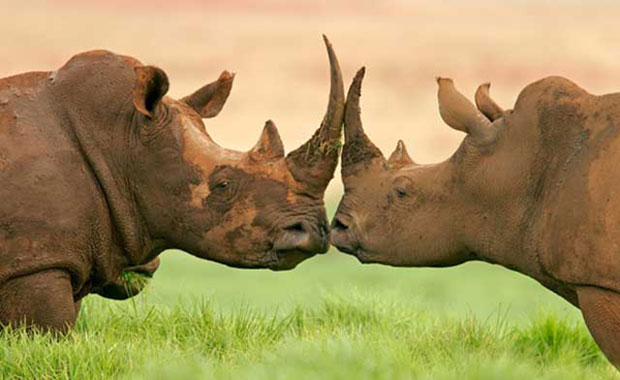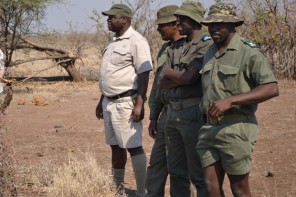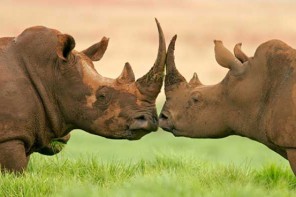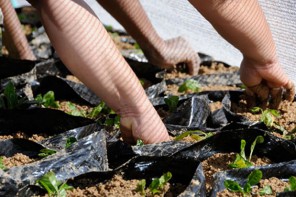Words by Cadine Pillay
An anti-poaching campaign will see South African television stars jumping out of a plane in the North West town of Rustenburg on the last weekend of July. The aim is to raise R10-million (US$1.2-million) for the protection of the country’s rhinos.
Some cast members of popular series The Wild, including Michelle Bradshaw, Faye Peters and Ty Keogh, will participate, along with evergreen rock band WONDERBoom’s frontman Cito.
Since the start of 2012, a shocking 281 rhinos have been killed by poachers in South Africa. The hardest hit regions are the Kruger National Park (164), Limpopo (40), KwaZulu-Natal (30) and the North West (26).
Skydive for Rhinos is a year-long campaign by the African Conservation Trust that aims to improve anti-poaching strategies across the country. All profits from skydiving will be donated to the trust. In a few days’ time, 61 people will take their first dive in the name of rhinos. They will be joined by 30 members of the skydiving community.
“When I was approached a little while ago to get involved with the project, I jumped at the chance.” said Cito. “I’ve always had a deep love and respect for rhinos and am appalled at the ongoing desecration of this incredible creature.”
While the government has criminalised poaching, he added, they are ineffective in enforcing the laws, and this is where action should come from.
Bradshaw shares his sentiments: “A beast that has survived 50-million years is about to be eradicated by human greed, leaving us bereft of an icon of Africa.
“This is an assault on everything I hold dear,” she said.
Ordinary people doing extraordinary things
The campaign, according to its organisers, is based on the ideal of ordinary people doing something extraordinary to protect the country’s rhino population and encourages even the business community to get involved.
“I believe we can become a lot more pro-active by getting involved with wonderful organisations and projects that are doing their best to respond to the rhino poaching crisis,” said Cito.
“I am an adrenalin junkie, and now I will link two of my passions together – skydiving and rhinos – what a combination! I can’t wait!”
After the first run on 28 and 29 July, the campaign moves to KwaZulu-Natal in August and then on to Port Elizabeth for the first weekend of September. It concludes in the Western Cape on World Rhino Day, 22 September.
By the end, 448 people will have dived – one for every rhino killed by poachers during 2011.
Members of the public who would like to take part in the skydiving campaign can contact the African Conservation Trust on +27 33 342 2844.
Ian Player Rhino Awareness Centre
While celebrities take to the skies to show their support, another effort is taking shape on the grounds of Shamwari Game Reserve in the Eastern Cape town of Port Elizabeth, thanks to the hard work of Dr Ian Player, a veteran in conservation circles and founder of the Wilderness Foundation.
Shamwari opened the Ian Player Rhino Awareness Centre in early June this year, where Player was a guest of honour.
The centre, which is open only for Shamwari guests, educates them about the growing problem of rhino poaching. It also complements the Born Free Foundation, which has a rehabilitation centre at the reserve.
The awareness centre was launched as part of the Forever Wild campaign, which was started in 2011. The campaign aims to gather support from the public and various stakeholders to help fight rhino poaching in South Africa and save the rhino from extinction.
“It is only through a global campaign and political will that we can save this remnant of the dinosaur age – the rhino,” said Player.
Guests staying at the Shamwari game lodges donate R100 ($12) per person and in return receive a special lower rate for each night’s stay. In turn Shamwari will donate R500 ($60) to the Wilderness Foundation for every room night sold.
The micro-chipping revolution
The opening of the centre coincided with a rhino micro-chipping and DNA capturing exercise led by veterinarian Dr Johan Joubert.
The animals were darted for the collection of DNA samples and ear notching for easy identification. DNA samples were then taken from the tail hair and horns. Guests got involved in collecting the samples, measuring the horns and extracting keratin samples from them. They also got to insert microchips in the horns for accurate tracking, before the samples were taken off site for safe keeping.
Shamwari experienced one of the first rhino poaching incidents in the country in 2008 and since then has taken all measures possible to prevent it from happening again.
“That first rhino was named Junior, and I was working for the reserve when he was born,” said Joubert.
“I watched him grow into a very large, strong bull, and he was like one of my own kids. Getting the call to say that Junior was dead was devastating.”
At the launch of the centre, a cheque for R182 800 ($21 600) was presented by Shamwari to the Wilderness Foundation. The money will be used by the foundation to raise public awareness on the on-going rhino poaching crisis.
Last year’s dive
[youtube_sc url=”http://youtu.be/iyuHKke0h_A” title=”Skydive%20for%20Rhinos”]










